| Srl | Item |
| 1 |
ID:
131994
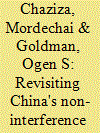

|
|
|
|
|
| Publication |
2014.
|
| Summary/Abstract |
This article evaluates, through statistical analysis, China's foreign policy of non-intervention, and answers the question of whether or not China has kept to its declared policy regarding intrastate wars relative to the other four powers that are permanent members of the UN Security Council. The evidence in this article suggests that the Chinese policy of non-interference was more a declaration than a policy. China significantly lower only from the United States and the USSR/Russia and differs solely in numbers of interventions, their extent, and diversity. Yet China is the only power that has not sent troops to interfere in intrastate wars. The country's share among the powers in supporting actors in intrastate wars is significantly less as time passes, although China exhibited no significantly different trends between the Cold War and the post-Cold War periods. It is, on the contrary, the United States and UK among the powers that have significantly increased their relative share of interference.
|
|
|
|
|
|
|
|
|
|
|
|
|
|
|
|
| 2 |
ID:
098135
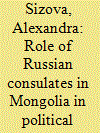

|
|
|
|
|
| Publication |
2010.
|
| Summary/Abstract |
This article is devoted to the political dimension of Russian consulates' activities in Mongolia between 1861 and 1917, and to their role in implementing the Russian "Far Eastern strategy." The imperial consulates made a significant contribution to the resolution of the "Mongolian problem" as an efficient mechanism of Russia's mediation in Mongolia's efforts to achieve autonomy, and in the "Kobdo" and "Altai" issues in the early 20th century. The article also analyzes the consulates' work to reinforce Russia's positions in Outer Mongolia and to maintain the balance of forces in the competitive international regional subsystem of the period.
|
|
|
|
|
|
|
|
|
|
|
|
|
|
|
|
| 3 |
ID:
134101
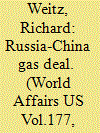

|
|
|
|
|
| Publication |
2014.
|
| Summary/Abstract |
Until recently, inadequate transportation infrastructure, along with rancorous arguments about price and a general atmosphere of mutual suspicion have kept Chinese purchases of Russian energy at relatively low levels. But now, with the historic May 21st agreement, the China National Petroleum Corporation (CNPC), the country's largest integrated energy company, and Russian energy giant Gazprom, which controls Russia's export gas pipelines, finally signed a thirty-year, $400 billion deal that will see as much as thirty-eight billion cubic meters (bcm) of Russian gas go to China annually from around 2018 to 2047. Gazprom will send gas pumped from its Kovyktin and Chayandin fields in eastern Siberia to the Beijing-Tianjin-Hebei metropolitan area in the north of China and the Yangtze River Delta in the east. The deliveries, which may take a few years to reach full capacity, will provide China with more than one-fifth of its present-day annual consumption of some one hundred and seventy bcm, although Chinese demand for natural gas is expected to rise above two hundred bcm by then.
|
|
|
|
|
|
|
|
|
|
|
|
|
|
|
|
| 4 |
ID:
133757
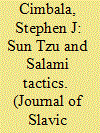

|
|
|
|
|
| Publication |
2014.
|
| Summary/Abstract |
Vladimir Putin used a composite of ancient and modern methods of military persuasion in first destabilizing, and then annexing, Crimea in February and March of 2014. Putin's use of military persuasion through Russian and proxy forces enabled him to annex Crimea and to set the stage for further imposition of Russia's will on Ukraine's eastern provinces. Russia's determination to resist excessive Westernization by Ukraine, especially the possibility of Ukrainian membership in NATO, exceeded the willingness of the U.S. and its allies to reverse Putin's gains in Crimea.
|
|
|
|
|
|
|
|
|
|
|
|
|
|
|
|
| 5 |
ID:
132707
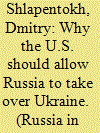

|
|
|
|
|
| Publication |
2014.
|
| Summary/Abstract |
The U.S. should follow the British wise policy of the early 20th century which implies the accommodation and sharing of power with an adversary. Reality would impose this transition anyway.
|
|
|
|
|
|
|
|
|
|
|
|
|
|
|
|